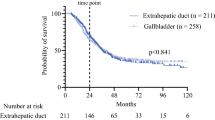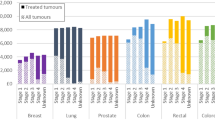Abstract
Background
Racial disparities in colorectal cancer persist. Late stage at presentation and lack of stage-specific treatment may be contributing factors. We sought to evaluate the magnitude of disparity remaining after accounting for gender, stage, and treatment using predicted survival models.
Methods
We used institutional tumor registries from a public health system (two hospitals) and a not-for-profit health system (nine hospitals) from 1995 to 2011. Demographics, stage at diagnosis, treatment, and survival were recorded. Hazard ratios (HRs) and predicted HRs were determined by Cox regression and postestimation analyses.
Results
There were 6,990 patients: 55.7 % white, 23.6 % African American, 15.1 % Hispanic, and 5.6 % Asian/other. Predictors of survival were surgery (HR 0.57, 95 % confidence interval [CI] 0.46–0.70), chemotherapy (HR 0.7, 95 % CI 0.62–0.79), female gender (HR 0.87, 95 % CI 0.83–0.90), age (HR 1.04, 95 % CI 1.03–1.05), and African American race (HR 3.6, 95 % CI 1.5–8.4). Balancing for stage, gender, and treatment reduced the predicted HRs for African Americans by 28 % and Hispanics by 17 %. In this model, African American and Hispanics still had the worst predicted HRs at younger ages, but whites had the worst predicted HR after age 75.
Conclusions
Gender, stage, and treatment partially accounted for worsened survival in African Americans and Hispanics at all ages. At younger ages, race-related disparities remained which may reflect tumor biology or other unknown factors. Once gender, stage, and treatment are balanced at older ages, the increased mortality observed in whites may be due to factors such as comorbidities. Further system- and patient-level study is needed to investigate reasons for colorectal cancer survival disparities.



Similar content being viewed by others
References
American Cancer Society. Cancer facts and figures, 2012. Atlanta, GA: American Cancer Society, 2012. http://www.cancer.org/acs/groups/content/@epidemiologysurveilance/documents/document/acspc-031941.pdf.
Jafri NS, Gould M, El-Serag HB, Duan Z, Davila JA. Incidence and survival of colorectal cancer among Hispanics in the United States: a population-based study. Dig Dis Sci. 2012 (in press).
Irby K, Anderson WF, Henson DE, Devesa SS. Emerging and widening colorectal carcinoma disparities between blacks and whites in the United States (1975–2002). Cancer Epidemiol Biomarkers Prev. 2006;15:792–7.
Polite BN, Dignam JJ, Olopade OI. Colorectal cancer and race: understanding the differences in outcomes between African-Americans and whites. Med Clin North Am. 2005;89:771–93.
Robbins AS, Siegel RL, Jemal A. Racial disparities in stage-specific colorectal cancer mortality rates from 1985 to 2008. J Clin Oncol. 2012;30:401–5.
Hernandez MN, Sussman DA, Lee DJ, Mackinnon JA, Fleming LE. Trends in colorectal cancer among Hispanics by stage and subsite location, 1989–2006. Clin Transl Gastroenterol. 2012;3:e21.
Pollack LA, Blackman DK, Wilson KM, Seeff LC, Nadel MR. Colorectal cancer test use among Hispanic and non-Hispanic U.S. populations. Prev Chronic Dis. 2006;3:A50.
Cooper GS, Koroukian SM. Racial disparities in the use of and indications for colorectal procedures in Medicare beneficiaries. Cancer. 2004;100:418–24.
Etzioni DA, El-Khoueiry AB, Beart RW Jr. Rates and predictors of chemotherapy use for stage III colon cancer: a systematic review. Cancer. 2008;113:3279–89.
Panchal JM, Lairson DR, Chan W, Du XL. Geographic variation and sociodemographic disparity in the use of oxaliplatin-containing chemotherapy in patients with stage III colon cancer. Clin Colorectal Cancer. 2013;12:113–21.
United States Census Bureau. State and country quick facts. http://quickfacts.census.gov/qfd/states/48/48201.html. Accessed 4 Jan 2013.
Haas JS, Brawarsky P, Iyer A, Fitzmaurice GM, Neville BA, Earle C. Association of area sociodemographic characteristics and capacity for treatment with disparities in colorectal cancer care and mortality. Cancer. 2011;117:4267–76.
Fitzgerald TL, Bradley CJ, Dahman B, Zervos EE. Gastrointestinal malignancies: when does race matter? J Am Coll Surg. 2009;209:645–52.
Yan B, Noone AM, Yee C, Banerjee M, Schwartz K, Simon MS. Racial differences in colorectal cancer survival in the Detroit metropolitan area. Cancer. 2009;115:3791–800.
Mayberry RM, Coates RJ, Hill HA, et al. Determinants of black/white differences in colon cancer survival. J Natl Cancer Inst. 1995;87:1686–93.
Roetzheim RG, Pal N, Gonzalez EC, Ferrante JM, Van Durme DJ, Krischer JP. Effects of health insurance and race on colorectal cancer treatments and outcomes. Am J Public Health. 2000;90:1746–54.
Robbins AS, Chen AY, Stewart AK, Staley CA, Virgo KS, Ward EM. Insurance status and survival disparities among nonelderly rectal cancer patients in the National Cancer Data Base. Cancer. 2010;116:4178–86.
Le H, Ziogas A, Lipkin SM, Zell JA. Effects of socioeconomic status and treatment disparities in colorectal cancer survival. Cancer Epidemiol Biomarkers Prev. 2008;17:1950–62.
Harrell WA, Spaulding LM. Social psychological models of choice behavior and drivers’ left turns. J Social Psychol. 2001;141:714–22.
Royston P, Moons KG, Altman DG, Vergouwe Y. Prognosis and prognostic research: developing a prognostic model. BMJ. 2009;338:b604.
Cummings P. Estimating adjusted risk ratios for matched and unmatched data: an update. Stata J. 2011;11:290–8.
Katz MH. Multivariable analysis: a primer for readers of medical research. Ann Intern Med. 2003;138:644–50.
Frederiksen BL, Osler M, Harling H, Ladelund S, Jorgensen T. Do patient characteristics, disease, or treatment explain social inequality in survival from colorectal cancer? Soc Sci Med. 2009;69:1107–15.
James TM, Greiner KA, Ellerbeck EF, Feng C, Ahluwalia JS. Disparities in colorectal cancer screening: a guideline-based analysis of adherence. Ethn Dis. 2006;16:228–33.
Laiyemo AO, Doubeni C, Pinsky PF, et al. Race and colorectal cancer disparities: health-care utilization vs different cancer susceptibilities. J Natl Cancer Inst. 2010;102:538–46.
Cancer facts and figures for Hispancis/Latinos, 2012–2014. http://www.cancer.org/acs/groups/content/@epidemiologysurveilance/documents/document/acspc-034778.pdf. Accessed 3 Feb 2013.
Slattery ML, Herrick J, Wolff RK, Caan BJ, Potter JD, Sweeney C. CDX2 VDR polymorphism and colorectal cancer. Cancer Epidemiol Biomarkers Prev. 2007;16:2752–5.
Goel A, Boland CR. Epigenetics of colorectal cancer. Gastroenterology. 2012;143:1442–60.e1441.
Stoehlmacher J, Ingles SA, Park DJ, Zhang W, Lenz HJ. The -9Ala/-9Val polymorphism in the mitochondrial targeting sequence of the manganese superoxide dismutase gene (MnSOD) is associated with age among Hispanics with colorectal carcinoma. Oncol Rep. 2002;9:235–8.
Agrawal S, Bhupinderjit A, Bhutani MS, et al. Colorectal cancer in African-Americans. Am J Gastroenterol. 2005;100:515–23.
Rex DK, Johnson DA, Anderson JC, Schoenfeld PS, Burke CA, Inadomi JM. American College of Gastroenterology guidelines for colorectal cancer screening 2009 [corrected]. Am J Gastroenterol. 2009;104:739–50.
Obeidat NA, Pradel FG, Zuckerman IH, et al. Racial/ethnic and age disparities in chemotherapy selection for colorectal cancer. Am J Manage Care. 2010;16:515–22.
White A, Liu CC, Xia R, et al. Racial disparities and treatment trends in a large cohort of elderly African-Americans and Caucasians with colorectal cancer, 1991 to 2002. Cancer. 2008;113:3400–9.
Landrum MB, Keating NL, Lamont EB, Bozeman SR, McNeil BJ. Reasons for underuse of recommended therapies for colorectal and lung cancer in the Veterans Health Administration. Cancer. 2012;118:3345–55.
Hoskins JM, Goldberg RM, Qu P, Ibrahim JG, McLeod HL. UGT1A1*28 genotype and irinotecan-induced neutropenia: dose matters. J Natl Cancer Inst. 2007;99:1290–5.
Iyer L, Das S, Janisch L, et al. UGT1A1*28 polymorphism as a determinant of irinotecan disposition and toxicity. Pharmacogenet J. 2002;2:43–7.
Pullarkat ST, Stoehlmacher J, Ghaderi V, et al. Thymidylate synthase gene polymorphism determines response and toxicity of 5-FU chemotherapy. Pharmacogenet J. 2001;1:65–70.
Hu CY, Chan W, Delclos GP, Du XL. Adjuvant chemotherapy and risk of gastrointestinal, hematologic, and cardiac toxicities in elderly patients with stage III colon cancer. Am J Clin Oncol. 2012;35:228–36.
Sanoff HK, Sargent DJ, Green EM, McLeod HL, Goldberg RM. Racial differences in advanced colorectal cancer outcomes and pharmacogenetics: a subgroup analysis of a large randomized clinical trial. J Clin Oncol. 2009;27:4109–15.
McCollum AD, Catalano PJ, Haller DG, et al. Outcomes and toxicity in african-american and caucasian patients in a randomized adjuvant chemotherapy trial for colon cancer. J Natl Cancer Inst. 2002;94:1160–7.
Yothers G, Sargent DJ, Wolmark N, et al. Outcomes among black patients with stage II and III colon cancer receiving chemotherapy: an analysis of ACCENT adjuvant trials. J Natl Cancer Inst. 2011;103:1498–506.
Albain KS, Unger JM, Crowley JJ, Coltman CA Jr, Hershman DL. Racial disparities in cancer survival among randomized clinical trials patients of the Southwest Oncology Group. J Natl Cancer Inst. 2009;101:984–92.
Hashiguchi Y, Hase K, Ueno H, et al. Impact of race/ethnicity on prognosis in patients who underwent surgery for colon cancer: analysis for white, African, and East Asian Americans. Ann Surg Oncol. 2012;19:1517–28.
Robbins AS, Pavluck AL, Fedewa SA, Chen AY, Ward EM. Insurance status, comorbidity level, and survival among colorectal cancer patients age 18 to 64 years in the National Cancer Data Base from 2003 to 2005. J Clin Oncol. 2009;27:3627–33.
Doubeni CA, Laiyemo AO, Major JM, et al. Socioeconomic status and the risk of colorectal cancer: an analysis of more than a half million adults in the National Institutes of Health–AARP Diet and Health Study. Cancer. 2012;118:3636–44.
Doubeni CA, Laiyemo AO, Reed G, Field TS, Fletcher RH. Socioeconomic and racial patterns of colorectal cancer screening among Medicare enrollees in 2000 to 2005. Cancer Epidemiol Biomarkers Prev. 2009;18:2170–5.
Cheng X, Chen VW, Steele B, et al. Subsite-specific incidence rate and stage of disease in colorectal cancer by race, gender, and age group in the United States, 1992–1997. Cancer. 2001;92:2547–54.
Griffith KA, Passmore SR, Smith D, Wenzel J. African-Americans with a family history of colorectal cancer: barriers and facilitators to screening. Oncol Nurs Forum. 2012;39:299–306.
Bass SB, Gordon TF, Ruzek SB, et al. Perceptions of colorectal cancer screening in urban African-American clinic patients: differences by gender and screening status. J Cancer Educ. 2011;26:121–8.
Greiner KA, Born W, Nollen N, Ahluwalia JS. Knowledge and perceptions of colorectal cancer screening among urban African-Americans. J Gen Intern Med. 2005;20:977–83.
Cameron KA, Francis L, Wolf MS, Baker DW, Makoul G. Investigating Hispanic/Latino perceptions about colorectal cancer screening: a community-based approach to effective message design. Patient Educ Counsel. 2007;68:145–52.
Goodman MJ, Ogdie A, Kanamori MJ, Canar J, O’Malley AS. Barriers and facilitators of colorectal cancer screening among Mid-Atlantic Latinos: focus group findings. Ethn Dis. 2006;16:255–61.
Coronado GD, Farias A, Thompson B, Godina R, Oderkirk W. Attitudes and beliefs about colorectal cancer among Mexican Americans in communities along the US–Mexico border. Ethn Dis. 2006;16:421–7.
Getrich CM, Sussman AL, Helitzer DL, et al. Expressions of machismo in colorectal cancer screening among New Mexico Hispanic subpopulations. Qual Health Res. 2012;22:546–59.
Dignam JJ, Colangelo L, Tian W, et al. Outcomes among African-Americans and Caucasians in colon cancer adjuvant therapy trials: findings from the National Surgical Adjuvant Breast and Bowel Project. J Natl Cancer Inst. 1999;91:1933–40.
Polite BN, Dignam JJ, Olopade OI. Colorectal cancer model of health disparities: understanding mortality differences in minority populations. J Clin Oncol. 2006;24:2179–87.
Brenner H. Long-term survival rates of cancer patients achieved by the end of the 20th century: a period analysis. Lancet. 2002;360(9340):1131–5.
Alexander DD, Waterbor J, Hughes T, Funkhouser E, Grizzle W, Manne U. African-American and Caucasian disparities in colorectal cancer mortality and survival by data source: an epidemiologic review. Cancer Biomark. 2007;3:301–13.
Wallace K, Hill EG, Lewin DN, et al. Racial disparities in advanced-stage colorectal cancer survival. Cancer Causes Control. 2013;24:463–71.
Wray CJ, Phatak UR, Robinson EK, et al. The effect of age on race-related breast cancer survival disparities. Ann Surg Oncol. 2013. (in press).
van de Water W, Markopoulos C, van de Velde CJ, et al. Association between age at diagnosis and disease-specific mortality among postmenopausal women with hormone receptor-positive breast cancer. JAMA. 2012;307:590–7.
Wray CJ, Castro-Echeverry E, Silberfein EJ, Ko TC, Kao LS. A multi-institutional study of pancreatic cancer in Harris County, Texas: race predicts treatment and survival. Ann Surg Oncol. 2012;19:2776–81.
Kilbourne AM, Switzer G, Hyman K, Crowley-Matoka M, Fine MJ. Advancing health disparities research within the health care system: a conceptual framework. Am J Public Health. 2006;96:2113–21.
Acknowledgment
Funded in part through an American Society of Colon and Rectal Surgeons Research Foundation Resident Initiation Grant (URP).
Author information
Authors and Affiliations
Corresponding author
Rights and permissions
About this article
Cite this article
Phatak, U.R., Kao, L.S., Millas, S.G. et al. Interaction Between Age and Race Alters Predicted Survival in Colorectal Cancer. Ann Surg Oncol 20, 3363–3369 (2013). https://doi.org/10.1245/s10434-013-3045-z
Received:
Published:
Issue Date:
DOI: https://doi.org/10.1245/s10434-013-3045-z




